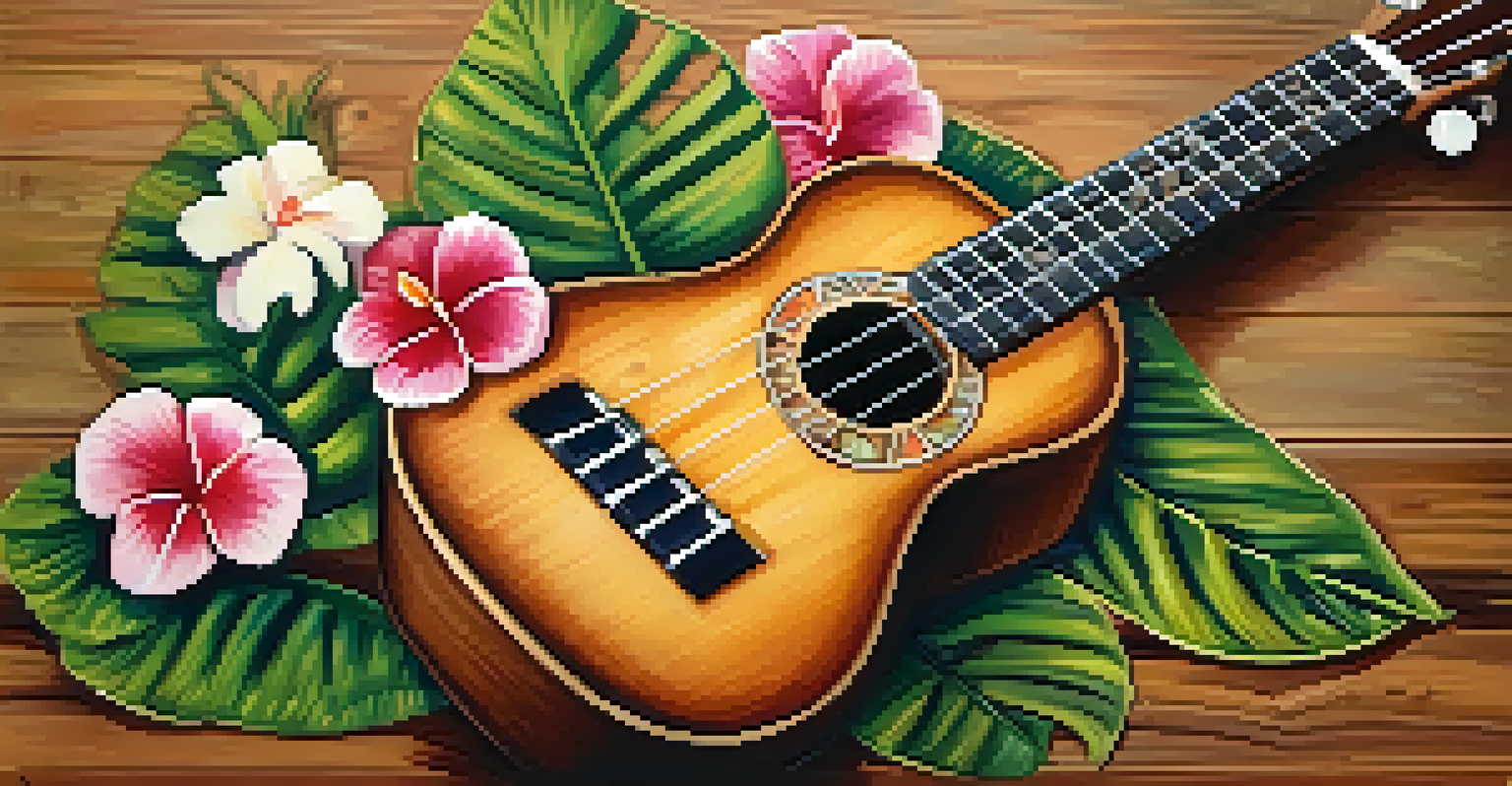The Ukulele's Presence in Pop Music: A Cultural Analysis

The Ukulele's Humble Origins in Hawaiian Culture
The ukulele, often affectionately called the 'uke,' has roots deeply embedded in Hawaiian culture. Introduced to Hawaii in the late 19th century by Portuguese immigrants, it quickly became a symbol of local music and festivities. Its bright, cheerful sound reflects the spirit of the islands, making it a beloved instrument among locals and visitors alike.
The ukulele is the instrument of the people. It’s the sound of joy and celebration.
In its earliest days, the ukulele was played at gatherings and celebrations, contributing to the vibrant cultural tapestry of Hawaiian life. The instrument's accessibility and light weight made it a favorite for casual play, allowing everyone—from children to elders—to join in the music-making process. This communal aspect is essential to understanding the ukulele's subsequent rise in global popularity.
As the ukulele began to gain traction outside of Hawaii, it brought with it a sense of joy and community. Its unique sound resonated with audiences around the world, laying the groundwork for its eventual incorporation into various music genres, including pop.
The Ukulele's Rise in Popular Music
The ukulele's journey into the realm of pop music can be traced back to the early 20th century when it featured in vaudeville acts and jazz ensembles. Artists like Tiny Tim brought the instrument to the mainstream in the 1960s, showcasing its quirky charm and playful sound. This period marked a turning point, as the ukulele started to be embraced by musicians across different genres.

Fast forward to the 21st century, and the ukulele has found its way into the hands of pop icons such as Jason Mraz and Ed Sheeran. Their catchy melodies and heartfelt lyrics, often accompanied by the cheerful strumming of the ukulele, have redefined its image from a novelty instrument to a staple in modern music. This evolution has made the ukulele a go-to choice for songwriters looking to evoke a sense of warmth and nostalgia.
Ukulele's Cultural Roots in Hawaii
The ukulele, introduced by Portuguese immigrants, became a symbol of Hawaiian music and community gatherings.
Moreover, the ukulele's simplicity is part of its appeal. With just four strings, it's easier to play than many other instruments, inviting aspiring musicians to pick it up and create. This accessibility has sparked a resurgence in interest, especially among younger generations eager to express themselves through music.
Cultural Significance of the Ukulele in Pop Music
Beyond its musical contributions, the ukulele represents a cultural bridge, connecting diverse musical traditions. As it travels through genres and geographical boundaries, it embodies a spirit of inclusivity, inviting people from all walks of life to participate in music-making. This aspect is particularly important in an increasingly globalized world where cultural exchange enriches artistic endeavors.
Music is the universal language of mankind.
The ukulele's presence in pop music often evokes a sense of nostalgia, reminding listeners of simpler times and carefree moments. Songs featuring the ukulele often carry themes of love, joy, and adventure, resonating with audiences on an emotional level. This emotional connection is one reason why the instrument continues to thrive in modern compositions.
Furthermore, many contemporary artists use the ukulele as a tool for storytelling, weaving personal narratives into their songs. By integrating the ukulele into their music, they signal a return to authenticity and simplicity, appealing to listeners who crave genuine expression in an era dominated by digital sounds and complex production.
Notable Ukulele Songs in Pop Music History
Several iconic songs have prominently featured the ukulele, showcasing its versatility across various pop music styles. One standout track is 'Somewhere Over the Rainbow' as performed by Israel Kamakawiwoʻole, which beautifully marries heartfelt lyrics with the gentle strumming of the ukulele. This song has become a beloved anthem of hope and nostalgia, demonstrating the instrument’s emotional power.
Another popular example is Jason Mraz's 'I’m Yours,' a feel-good song that invites listeners to celebrate love and life. The ukulele's upbeat rhythm complements Mraz's laid-back vocals, creating an inviting atmosphere that has made this song a staple at weddings and gatherings. Such tracks illustrate how the ukulele can enhance the emotional depth of pop music.
Rise of Ukulele in Pop Music
From vaudeville acts to modern pop stars, the ukulele has evolved into a beloved instrument across various music genres.
Moreover, contemporary hits like 'Riptide' by Vance Joy have further solidified the ukulele's place in modern pop. The song’s catchy chorus and playful melody have captured the hearts of millions, proving that the ukulele can be both a fun and powerful element in songwriting. This ongoing trend suggests that the ukulele will continue to play a significant role in the evolution of pop music.
The Ukulele in Music Education and Its Popularity
The ukulele's rise in pop music has also influenced its popularity in music education. Schools and community programs have increasingly adopted the ukulele as a primary instrument for teaching music, owing to its simplicity and accessibility. Students find it easier to learn basic chords and strumming patterns, making it an ideal starting point for budding musicians.
This educational shift not only fosters a love for music but also encourages creativity and self-expression among young learners. As they gain confidence in their playing, many students are inspired to compose their own songs. This process of creating music can be incredibly empowering, helping to build resilience and a sense of accomplishment.
Additionally, the ukulele's social aspect—often played in groups or ensembles—promotes teamwork and collaboration among students. As they play together, they develop essential communication skills and a sense of community, reinforcing the idea that music is best enjoyed when shared. This emphasis on connection further enhances the ukulele’s cultural significance.
The Global Reach and Cultural Exchange of the Ukulele
The ukulele's charm has led to its widespread adoption around the globe, transcending its Hawaiian origins. From Europe to Asia, musicians are experimenting with the ukulele, incorporating it into diverse genres such as folk, rock, and even classical music. This global reach highlights the instrument's adaptability and its ability to resonate with different cultures.
International collaborations often showcase the ukulele alongside traditional instruments, creating unique blends of sound that reflect cultural exchange. These cross-cultural projects not only celebrate the ukulele but also emphasize the importance of collaboration in the music world. By merging different musical styles, artists can create something entirely new and exciting.
Global Adoption and Cultural Exchange
The ukulele's charm has led to its adaptation worldwide, fostering collaborations and blending diverse musical traditions.
Moreover, the internet has played a pivotal role in spreading the ukulele's influence. Online tutorials, social media, and platforms like YouTube have made it easier than ever for anyone to learn and share their love for the instrument. This digital age of connectivity fosters a community of ukulele enthusiasts who inspire one another, further solidifying the ukulele's place in contemporary music culture.
The Future of the Ukulele in Pop Music
As we look to the future, the ukulele's presence in pop music shows no signs of waning. With its growing popularity among emerging artists, we can expect to hear more innovative uses of the instrument across different genres. The fusion of the ukulele with electronic music, for example, opens up exciting possibilities for new sounds and collaborations.
Additionally, as music continues to evolve, the ukulele will likely adapt to reflect shifting cultural trends and tastes. Its inherent versatility allows musicians to experiment and push creative boundaries, ensuring that it remains relevant in an ever-changing musical landscape. This adaptability is a testament to the ukulele's enduring appeal.

Ultimately, the ukulele's role in pop music is a celebration of cultural diversity and artistic expression. As artists from various backgrounds continue to embrace the instrument, the ukulele will undoubtedly remain a powerful symbol of connection, joy, and creativity in the world of music.